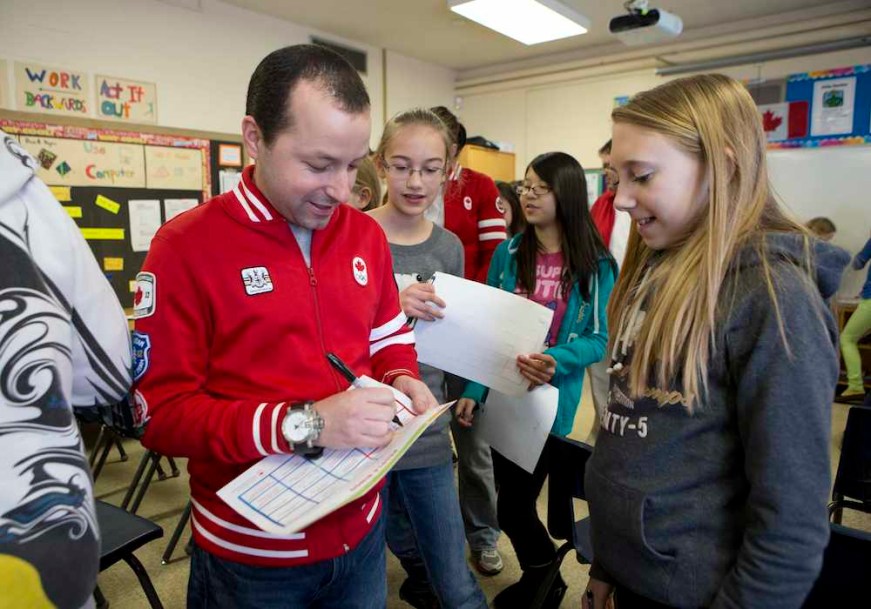Students Set to Get 'Mentally Fit'
The idea of fitness goes beyond just strength, speed and endurance. True fitness includes the mind, too. Ask any Olympian and they will tell you that finding success both on and off the field of play means being fit mentally.
“When I think about the term mental fitness, I think about a lot of different things,” said Olympic gold and silver medallist freestyle skier Jennifer Heil. “I think about fitness in general. If I want to be strong physically, what do I have to do? I am going to go to the gym, I am going to work hard, I am going to lift weights, I am going to run sprints, I am going to do all these things. When I think about mental fitness, compared to physical fitness, I think about a lot of the same things. If I am going to get stronger and I am going to be mentally fit, it means that I am going to have to practice. So I have to do deliberate practice as well.”
February 12th will mark the third annual Bell Let’s Talk day in Canada and mental health will be at the forefront of the news. According to professionals, one in five people will experience a form of mental illness at some point in their life. Unfortunately, due to the stigma surrounding it, most of these people will never seek treatment nor will they be open to talk to people in their lives about it including family and friends.

Brian Price, a survivor of childhood leukemia, teaches children the importance of perseverance and never giving up. COC Photo: George Fadel
As a national partner of Bell Canada, The Canadian Olympic Committee is taking ownership around this idea and has launched the latest classroom module of its Canadian Olympic Schools Program called ‘Give Your Everything – Be A Champion For Life’ centred around the idea of promoting mental fitness.
For Olympic coxswain Brian Price, being mentally fit was a lesson taught early in life due to unfortunate circumstances and has allowed him to reach the top of his sport. Price was diagnosed with leukemia at the age of seven and through his recovery was taught the meaning of overcoming adversity.
Through his experience, Price realized his main traits were determination, perseverance and courage which he has used over a span of a career that has included Olympic gold and silver medals and three world championship titles.
“I found in sport over my career that, you know probably 90% of it, once you get to an elite level it is all in your head,” said Price. “When I line up against other boats in the world and I look across, physically, we’re all pretty close to the same. We do tweak different things and have different protocols, but the end of the day for us in the men’s eight it comes down to who is stronger mentally, who is going to be able to hold on mentally together.”
The school program also aims to teach children about the importance of a positive attitude in overcoming challenges, setting goals, having a connected focus and living happy, fulfilled lives.

Mark Oldershaw is part of a team of Olympians taking part in the latest Canadian Olympic Schools Program on the importance of mental fitness. COC Photo: George Fadel
“Every single Olympian got to where they did because they worked really hard on their thoughts and beliefs, developing a healthy mind as well as a healthy body,” said Mark Oldershaw, Olympic bronze medallist in Canoeing and the fifth member of his family to participate in an Olympic Games. “ We’ve all been scared or worried and felt those butterflies in our stomach, or felt discouraged at some point. The great thing about practicing your mental fitness is learning by heart that every single one of us is a unique person. For me, that made a huge difference to achieving my dreams and happiness, both on and off the water.”
The Canadian Olympic Committee’s education model has embraced this, amplified it and made it accessible to students across Canada, an exciting notion for educators and leaders says internationally renowned sport and life enhancement leader from the University of Ottawa, Dr. Terry Orlick (PhD).
“We’re very excited about what this classroom module can mean for Canadian students, both now and as they move through adolescence and on into adulthood,” said. “All of us will learn, live and perform better, whether we’re high performance athletes, students or school-aged children by learning and practicing these positive life enhancement skills. We will all feel better, contribute more, reduce unnecessary stress and add joy to our lives by learning these positive mental fitness skills. Now is the time to begin this life enhancement initiative.”













